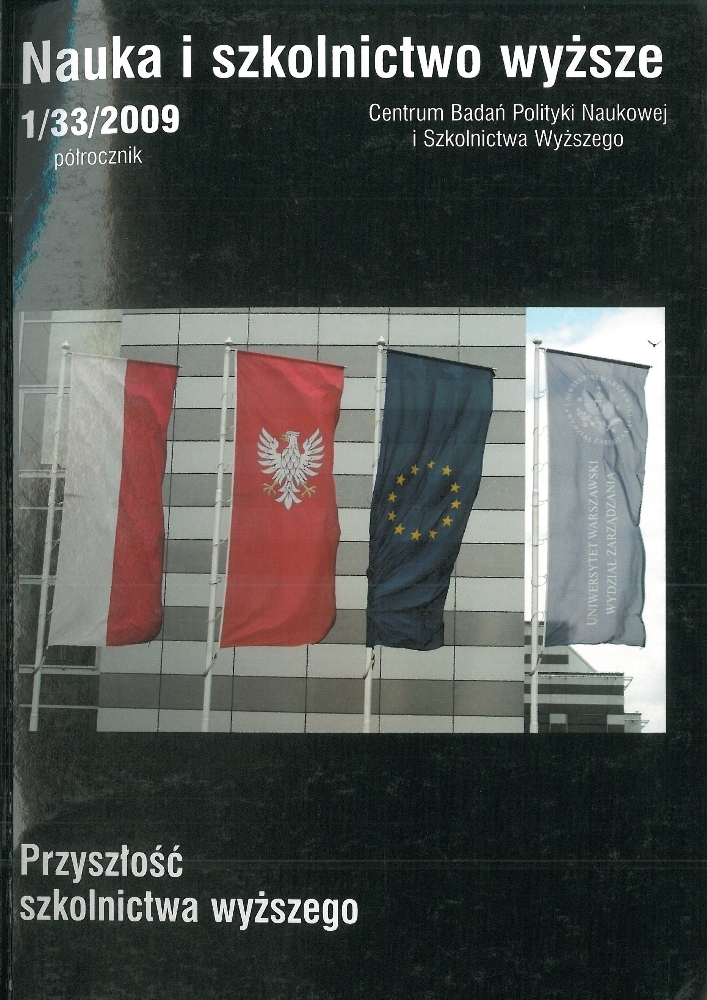Abstrakt
W większości krajów europejskich liczba studentów kierunków rolniczych będzie ulegać zmniejszeniu. W Polsce natomiast - dzięki otwieraniu nowych kierunków rolniczych zarówno w państwowych wyższych szkołach zawodowych, jak i w uczelniach niepublicznych - liczba studentów szeroko rozumianych kierunków rolniczych będzie się stopniowo zwiększać. Zarówno w krajach „starej” Unii Europejskiej, jak i w Polsce wybór kierunków rolniczych będzie skutkował osiąganiem mniejszych możliwości samorealizacji w życiu zawodowym. W Stanach Zjednoczonych i w Europie następuje wyraźne odejście od wąsko pojętego, technologicznego kształcenia rolniczego w stronę kształcenia w zakresie ochrony zasobów naturalnych (natural resources) oraz zarządzania rozwojem obszarów wiejskich (rural development management). W Polsce ten proces jest słabo zauważalny, zwłaszcza na tradycyjnych wydziałach rolniczych. W najbliższej przyszłości uczelnie rolnicze powinny zmodyfikować swoją organizację, programy studiów i sposób realizacji procesu dydaktycznego. Jeśli tego nie uczynią, będą stopniowo wyłączane z globalnego kształcenia rolniczego na poziomie wyższym.
Bibliografia
Allen J., Der Velden R. 2007 The Flexible Professional in the Knowledge Society. General Results ofthe REFLEX Project, Research Centre for Education and the Labor Market, Maastricht University, Maastricht,
The Netherlands.
Corlett J.T., MacFarlaine I G. 1989 University Science and Agriculture Education in Developing Countries, „Higher Education”, nr 18.
Desrochers D. 2002 Higher Education’s Contributions to the Knowledge Economy (www.solutionsforourfuture.org).
Ederer P, Schuller R, Willms S. 2008 Unimsity Systems Ranking: Citizens and Society in theAge ofthe Knowledge, „Lisbon Council Policy Brief” (Brussels).
Fulton O, Santiago R, Enquist Ch, El-Khawas E., Hackel E. 2008 Raport OECD na temat szkolnictwa wyższego. Polska, Ministerstwo Nauki i Szkolnictwa Wyższego, Warszawa.
Gasperini L. 2000 From Agricultural Education to Education for Rural Development and Food Security, „Ali for Education and Food for Ali”. Fifth European Conference on Higher Agricultural Education. University of Plymouth, United Kingdom, 10-13 September 2000.
Koucky J., Meng Ch, Der Velden R. 2007 REFLEX Country Study, Research Centre for Education and Labour Market, Maastricht.
Lamo A., Messina J., Wasmer E. 2006 Are Specific Skills an Obstacle for Labor Market Adjustment. Theory and Practice ofan Application to EU Enlargement, European Central Bank, „Working Paper Series”, nr 585.
Maguire C. 2002 Changing Expectations for Higher Agricultural Education, „HEP Newsletter”, nr XX.
Mulder M. 2005 Agricultural Education - Building Competence for lnnovation of the Agri-Food Complex, Cedefop, Greece.
Mulder M., Kupper H. 2006 The Futurę of Agricultural Education: The Case of the Netherlands, „Journal of Agricultural Education and Extension”, nr 12.
OECD 1997 International Standard Classification of Education 1997, Organisation for Economic and Cultural Development, Paris.
OECD 2004, 2007 Education at a Glance, Organisation for Economic and Cultural Development, Paris.
OECD 2008a Tertiary Education for the Knowledge Society. OECD Thematic Review of Tertiary Education. Synthesis Report. Overview, Organisation for Economic and Cultural Development, Paris.
OECD 2008b Tertiary Education for the Knowledge Society. OECD Thematic Review of Tertiary Education. Synthesis Report, 1.1, Organisation for Economic and Cultural Development, Paris.
OECD 2008C Tertiary Education for the Knowledge Society. OECD Thematic Review of Tertiary Education. Synthesis Report, t. 3., Organisation for Economic and Cultural Development, Paris.
Podlaski S. 2008 Charakterystyka stanu obecnego i kierunki zmian kształcenia w uczelniach rolniczych, Konferencja „Aktualny stan i przyszłość wyższego kształcenia rolniczego” Szkoła Główna Gospodarstwa Wiejskiego, Warszawa, 15-17 lutego 2008.
RehmanT, Park J. 2004 An Educational Evolution from Agricultural Science to Rural Management - A Perspective from the UK, 7th European Conference on Higher Agricultural Education, 21-24 August 2004, Plymouth, UK.
Strawiński R 2008 Changes in Return to Higher Education in Poland 1998-2005, Social Science Research Network (www.ssrn.com).
Teichler U. 2008 Student Mobility: Where Do We Come from Where Are We, Where Are We Going to Inside the EHEA, Bologna Conference „Fostering Student Mobility: Next Steps” , Brussels, 29-30 May 2008.
World Economic Forum 2008 Global Information Technology Report 2008-2009 (www.weforum.org).
Zahorska M., Walczak D. 2005 Polski system edukacyjny a rynki pracy w UE, „Analizy i Opinie” nr 51, Instytut Spraw Publicznych, Warszawa.
http://www.innowacyjnosc.gpw.pl
http://www.insead.edu/v l/gitr/wef/main/analysis/
http://www.oecd.org. Ask the economists: Education - learn more, earn more?
http://www.wynagrodzenia.pl Sedlak&Sedlak
